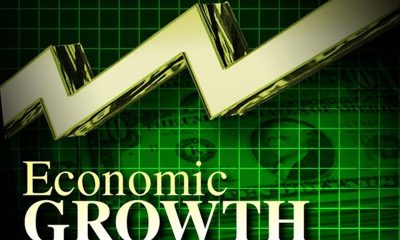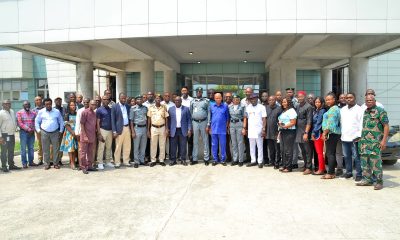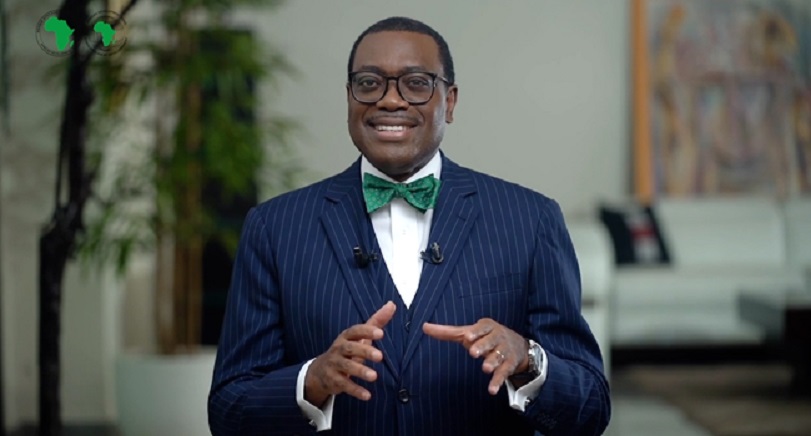Economy
We Plan to Improve Capital Market’s Contribution to Economic Growth—SEC DG

By Modupe Gbadeyanka
The Director-General of the Securities and Exchange Commission (SEC), Mr Lamido Yuguda, has said his team plans to improve the capital market’s contribution to economic growth through the implementation of the Capital Market Master Plan, which is currently under review.
Mr Yuguda said this during a meeting with the management team of Financial Sector Deepening (FSD) Africa in Abuja over the weekend.
He informed the team that the master plan review has been concluded by PwC and expressed confidence that it will be beneficial to the capital market and the nation at large.
“We are glad about all the assistance we have received, the Master plan review has been concluded by PWC and we hope that the implementation of the Capital Market Master Plan will deepen our market and improve the capital market’s contribution to our economic growth and national development.
“To this end, the review of the Capital Market Master Plan better positions the SEC to deliver on these objectives in these very challenging times.
“The FSD Africa and SEC Nigeria’s laudable partnership underscores our mutual goals to build financial markets that are robust, efficient and above all-inclusive,” he said.
The DG also restated the commitment of the agency to ensuring that technology plays a major role in ensuring that the nation’s capital market attains its full potential, expressing the commission’s delight with the support from FSD Africa in the areas of human resource transformation and information technology strategy.
“I cannot but express my support to FSD Africa for the various supports they have given to the commission in various areas. We are very excited about the human resource transformation exercise as the report will assist the commission in profound ways that will lead to optimal productivity of staff.
“What you are doing is commendable, you are looking at African financial markets and trying to assist to ensure that productivity and development are enhanced. We, therefore, assure you that these investments are well placed and we will continue to work to earn the confidence that you have in us,” he stated.
The SEC DG disclosed that the current management is also looking at other sources of support so that the march towards that agency that everyone wants to see in the future is very fast and very efficient.
“The commission has also been doing a number of things to ensure that the aim of these supports is not defeated. Since we came in we have prioritised the issue of human resource management, we want to leave behind a culture of excellence.
“Thank you for the considerable assistance on IT. What we have done too is to explore domestic sources of funding for our IT infrastructure and thankfully, we are making tremendous progress in that regard,” he added.
In his remarks, Chief Executive Officer of FDS Africa, Mr Mike Napier, expressed excitement that the SEC decided to embark on the various initiatives in a bid to have a stronger and better capital market regulator which translates into a well-regulated market.
Mr Napier said well-functioning capital markets can play a vital role in support of inclusive economic growth by channelling long term finance into infrastructure and other large-scale projects that create jobs and improve access to markets, adding that strengthening regulatory capacity in capital markets is an essential pre-condition for building investor confidence.
He said, “We are very happy that you have taken these challenges to embark on these various initiatives to ensure that your processes are better which will ultimately lead to a better regulator for the capital market.
“In FSD Africa we are embracing innovation and that is why we are providing support for these various projects, it is a long journey but we know we will get there at the end of it all.”
Mr Napier expressed satisfaction with the SEC for embracing innovation in a bid to become a progressive regulator stating that across Africa there are not many organisations that are able to do this especially given the issues of the paucity of funds.
“The big one would be when the market players note the changes in the SEC and the transformations that have taken place. We are glad you are on that journey and we hope it will end well,” he added.
FSD Africa’s support is centred around the development of capital markets master plans, conducting institutional capacity assessments, and creating capacity for sustainable finance such as green bonds, helping markets to adapt to their operating climate.
Economy
Champion Breweries Concludes Bullet Brand Portfolio Acquisition

By Aduragbemi Omiyale
The acquisition of the Bullet brand portfolio from Sun Mark has been completed by Champion Breweries Plc, a statement from the company confirms.
This marks a transformative milestone in the organisation’s strategic expansion into a diversified, pan-African beverage platform.
With this development, Champion Breweries now owns the Bullet brand assets, trademarks, formulations, and commercial rights globally through an asset carve-out structure.
The assets are held in a newly incorporated entity in the Netherlands, in which Champion Breweries holds a majority interest, while Vinar N.V., the majority shareholder of Sun Mark, retains a minority stake.
Bullet products are currently distributed in 14 African markets, positioning Champion Breweries to scale beyond Nigeria in the high-growth ready-to-drink (RTD) alcoholic and energy drink segments.
This expansion significantly broadens the brewer’s addressable market and strengthens its revenue base with an established, profitable portfolio that already enjoys strong brand recognition and consumer loyalty across multiple markets.
“The successful completion of our public equity raises, together with the formal close of the Bullet acquisition, marks a defining moment for Champion Breweries.
“The support we received from both existing shareholders and new investors reflects strong confidence in our long-term strategy to build a diversified, high-growth beverage platform with pan-African scale.
“Our focus now is on disciplined execution, integration, and delivering sustained value across markets,” the chairman of Champion Breweries, Mr Imo-Abasi Jacob, stated.
Through this transaction, Champion Breweries is expected to achieve enhanced foreign exchange earnings, expanded distribution leverage across African markets, integrated supply chain efficiencies, portfolio diversification into high‑growth consumer beverage categories, and strengthened presence in the RTD and energy drink segments.
The acquisition accelerates Champion Breweries’ transition from a regional brewing business to a multi-category consumer platform with continental reach.
Bullet Black is Nigeria’s leading ready-to-drink alcoholic beverage, while Bullet Blue has built a strong presence in the energy drink category across several African markets.
Economy
M-KOPA Nigeria Plans Expansion to Edo, Others After N231bn Credit Milestone

By Adedapo Adesanya
Emerging market fintech firm, M-KOPA, has announced plans to deepen its reach in Nigeria to the South South and South East regions, starting with Edo this year, after providing N231 billion in credit to over 1 million customers in the country.
The firm released its first Nigeria-focused Impact Report, which showed that Nigeria is M-KOPA’s fastest-growing market and fastest to reach the milestone.
Since its foray into the Nigerian market in 2019, M-KOPA has been working to dismantle barriers to financial inclusion by providing flexible smartphone financing and digital financial tools that align with how people in the informal economy earn and manage their money.
It operates in six states in the country, including Lagos, Ogun, and Oyo, among others.
The report highlights the company’s contribution to income generation, digital inclusion and economic opportunity for Every Day Earners across the country.
The report showed that M-KOPA has enabled 290,000 first-time smartphone users, while 56 per cent of agents accessed their first income opportunity through the platform.
It showed high income and livelihood gains among its users, with about 77 per cent of customers leveraging smartphones or digital loans obtained through the platform to generate income, indicating that access to financed devices is directly supporting micro-entrepreneurial activity and informal sector productivity.
Furthermore, 75 per cent of users report higher earnings since gaining access to M-KOPA’s services, suggesting measurable improvements in personal revenue streams. On the distribution side, 99 per cent of agents disclose increased earnings, reflecting positive spillover effects across the company’s value chain.
In addition, 81 per cent of long-term customers state that their household expenses have improved, pointing to enhanced financial stability and better consumption smoothing over time.
Speaking on the report, Mr Babajide Duroshola, General Manager, M-KOPA Nigeria, said, “Nigeria represents extraordinary potential, and we’re proud that it has become M-KOPA’s fastest-growing market. Our Impact Report shows that when Every Day Earners gain access to the right digital and financial tools, they use them to create stability and long-term progress for their families. This is about access that unlocks opportunity and sustained prosperity.”
On its expansion plans Nigeria-wide, the M-KOPA helmsman said, “Many of the states we are considering are already similar to the ones we are currently in proximity… So, there is proximity and similarity between these states, and that’s what we are going to do, starting with Edo.”
He noted that as M-KOPA Nigeria continues to expand, the focus remains on ensuring more everyday earners gain access to the digital and financial tools they need to build resilient, prosperous futures in Nigeria’s rapidly digitising economy.
Economy
Tinubu Okays Extension of Ban on Raw Shea Nut Export by One Year

By Aduragbemi Omiyale
The ban on the export of raw shea nuts from Nigeria has been extended by one year by President Bola Tinubu.
A statement from the Special Adviser to the President on Information and Strategy, Mr Bayo Onanuga, on Wednesday disclosed that the ban is now till February 25, 2027.
It was emphasised that this decision underscores the administration’s commitment to advancing industrial development, strengthening domestic value addition, and supporting the objectives of the Renewed Hope Agenda.
The ban aims to deepen processing capacity within Nigeria, enhance livelihoods in shea-producing communities, and promote the growth of Nigerian exports anchored on value-added products, the statement noted.
To further these objectives, President Tinubu has authorised the two Ministers of the Federal Ministry of Industry, Trade and Investment, and the Presidential Food Security Coordination Unit (PFSCU), to coordinate the implementation of a unified, evidence-based national framework that aligns industrialisation, trade, and investment priorities across the shea nut value chain.
He also approved the adoption of an export framework established by the Nigerian Commodity Exchange (NCX) and the withdrawal of all waivers allowing the direct export of raw shea nuts.
The President directed that any excess supply of raw shea nuts should be exported exclusively through the NCX framework, in accordance with the approved guidelines.
Additionally, he directed the Federal Ministry of Finance to provide access to a dedicated NESS Support Window to enable the Federal Ministry of Industry, Trade and Investment to pilot a Livelihood Finance Mechanism to strengthen production and processing capacity.
Shea nuts, the oil-rich fruits from the shea tree common in the Savanna belt of Nigeria, are the raw material for shea butter, renowned for its moisturising, anti-inflammatory, and antioxidant properties. The extracted butter is a principal ingredient in cosmetics for skin and hair, as well as in edible cooking oil. The Federal Government encourages processing shea nuts into butter locally, as butter fetches between 10 and 20 times the price of the raw nuts.
The federal government said it remains committed to policies that promote inclusive growth, local manufacturing and position Nigeria as a competitive participant in global agricultural value chains.
-

 Feature/OPED6 years ago
Feature/OPED6 years agoDavos was Different this year
-
Travel/Tourism10 years ago
Lagos Seals Western Lodge Hotel In Ikorodu
-

 Showbiz3 years ago
Showbiz3 years agoEstranged Lover Releases Videos of Empress Njamah Bathing
-

 Banking8 years ago
Banking8 years agoSort Codes of GTBank Branches in Nigeria
-

 Economy3 years ago
Economy3 years agoSubsidy Removal: CNG at N130 Per Litre Cheaper Than Petrol—IPMAN
-

 Banking3 years ago
Banking3 years agoSort Codes of UBA Branches in Nigeria
-

 Banking3 years ago
Banking3 years agoFirst Bank Announces Planned Downtime
-

 Sports3 years ago
Sports3 years agoHighest Paid Nigerian Footballer – How Much Do Nigerian Footballers Earn

















